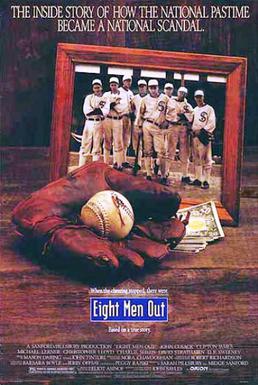Eight
Men Out (1988)
Directed by John Sayles
Screenplay by John Sayles, based on
the book by Eliot Asinof
Runtime: 1 hr, 59 min
Baseball
has had a long history of, shall we say, less than ethical behavior. From Ty Cobb sharpening his spikes to take
out fielders, to allegations that Gaylord Perry threw spitballs, all the way to
the still-current steroid era, the national pastime has had scandal galore and
then some. But one incident in
particular stands out, and that of course would be the Black Sox scandal, in
which in several players on the Chicago White Sox threw the 1919 World Series
as part of gambling scandal. It is this
dark episode of baseball lore which John Sayles chronicles in Eight Men Out.
The
eight men in the title refer to the ballplayers who were implicated in the
scandal. The most famous is “Shoeless”
Joe Jackson (D. B. Sweeney), but he’s largely in the background. In terms of the players, Sayles chooses to
focus on the lesser known figures: first baseman and ringleader Chick Gandil
(Michael Rooker), conflicted ace pitcher Eddie Cicotte (David Strathairn), and,
especially, third baseman Buck Weaver (John Cusack), whose involvement in the
scandal has been, as with Jackson’s, hotly contested.
The
strength of Sayles’ film partially lies in how he portrays the chemistry, or
lack thereof, within the White Sox organization. Forget feelings on throwing the series; the opening
sequence, depicting the last game of the regular season, shows the players
ragging and sniping at each other regarding place of birth and education
level. Perhaps more importantly, the
scene highlights the players’ incentive to throw the series, when owner Charles
Comiskey (Clifton James) gives his team flat champagne in lieu of an actual
bonus for winning the pennant.
Had
the film kept the action squarely on the players, the story told would be both
crystal clear and compelling on the character level. Unfortunately, too broad a net is cast; every
angle of the Black Sox scandal is covered.
The gamblers who initiate the scandal; the circle of Arnold Rothstein
(Michael Lerner), who provided the money; the journalists who suspect something
is up; the families of the players—they all get screen time. But there simply isn’t enough screen time to
adequately cover everything involved in the conspiracy.
In
fact, the movie juggles so many story elements that there is scant time to
register who’s who in the scandal. Few
of the characters who are not on the White Sox are given substantive
introductions, and unless one is intimately familiar with the history of the
1919 World Series, I can’t imagine how one could follow this story without
significant mental effort. One of my
rules for filmmaking is that the audience should always be able to determine
what is literally happening on screen, but Eight
Men Out has too broad a scope to follow that rule.
The
performances in the movie are significantly better than the structure, though
the best turns tend to be in supporting roles.
Christopher Lloyd keeps a comic undertone as gambling man Bill Burns,
and Charlie Sheen is perfectly cast as the not-entirely-there centerfielder
Happy Felsch. My personal favorites,
however, are Strathairn, who appears the most torn up about the scandal, and
Gordon Clapp as beleaguered catcher Ray Schalk, constantly fuming that his
pitchers are crossing him up and not throwing breaking balls.
Besides
the acting, what Eight Men Out does
best is capture the game on the field and in the stands. While the real story of the Black Sox scandal
involves backrooms and disreputable gamblers, this ultimately is a baseball
film. From Cicotte hitting the first
batter of the series to Jackson’s home run during garbage time in game eight,
Sayles puts a gradually changing atmosphere into each at-bat. The crowd in Cincinnati is on its feet from
the get go, but by the time the last game is played in Chicago, both the
suspected fix and the inevitability of defeat weigh heavily on the fans.
As
a matter of fact, the film captures the emotions in the park so well that it
may have been a more effective movie if the fix were gradually revealed through
the actions of the players and the reactions of the fans and journalists. It would have kept the character count down,
added a sense of mystery and dread to the proceedings, and allowed for some
more complex character developments.
Sure, anyone with a cursory knowledge of baseball history would know that
the series was fixed, but the question of how it’s exposed would still remain.
Alas,
that not the movie that John Sayles made.
I find it difficult to fault a director for ambition, and covering every
aspect of a story certainly would qualify as an ambitious endeavor. But to accomplish such a feat, one must lay
the foundations properly, and that’s ultimately what sinks the film. Not enough background and too little
individual character development prevent Eight
Men Out from being a home run. Maybe
it’s a single that just gets past the shortstop. In other words, it’s just a routine,
unspectacular baseball flick.

No comments:
Post a Comment